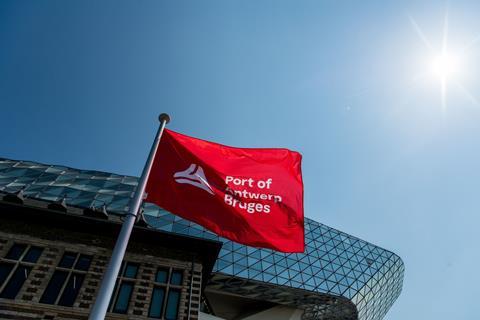The port said it limited the impact of economic instability as container demand fell in the first six months of 2023
The Port of Antwerp-Bruges has revealed that total throughput stood at 139m tonnes during the first six months of this year, a fall of 5.5 per cent compared with the same period of 2022.

While the global economic situation caused a drop in demand for container transport, other cargo flows showed a “mixed picture”.
”In the current unstable economic conditions, the port is holding up well and is also gaining market share in container handling compared to the other ports in the Hamburg-Le Havre range,” it stated.
Operational challenges and congestion at the container terminals were resolved after two difficult years, with deviated cargo returning.
This resulted in an improvement in the second quarter (-4.6 per cent in TEU) compared to the results after the first quarter of this year (-5.8 per cent in TEU).
However, the uncertain economic situation, decreasing industrial production and low consumer confidence led to a global slowdown in demand for container transport of as much as 9 per cent in the first quarter of this year.
This meant a decrease in container handling at Port of Antwerp-Bruges of 5.9 per cent in tons and 5.2 per cent in TEUs, compared with the first six months of 2022.
However, Antwerp-Bruges said that, compared with the other ports in the Hamburg-Le Havre range, its market share increased by 1 percentage point to 30.6 per cent in the first three months of 2023.
Fruit drives reefer growth
In contrast to the overall decline in container throughput, the number of reefer containers grew by 10.6 per cent compared with the same period of 2022.
The port said that an important part of this was down to fruit such as bananas, kiwifruit, pineapples, melons, citrus and lychees.
”Handling these perishables requires the necessary expertise and specialisation, which specialised terminals, coldstores and logistics service providers take care of,” it said. ”They make Port of Antwerp-Bruges the most important fruit port of Europe.”
Jacques Vandermeiren, CEO of Port of Antwerp-Bruges, confirmed that the economic situation continued to pose “major challenges” as it had around the world, and this was reflected in the figures.
”But in these volatile conditions, the port is holding up relatively well,” he said.” The fact that, in addition, our market share is increasing is a confirmation of our resilience and strength as a merged port.
”What the second half of the year will bring, depends on many uncertain factors, including energy prices, which have a major impact on the chemical sector,” Vandermeiren added. ”It is at least hopeful that scheduled services that were discontinued because of Covid-19 are now being restarted, and shipping companies are choosing our port as their first port of call.”



